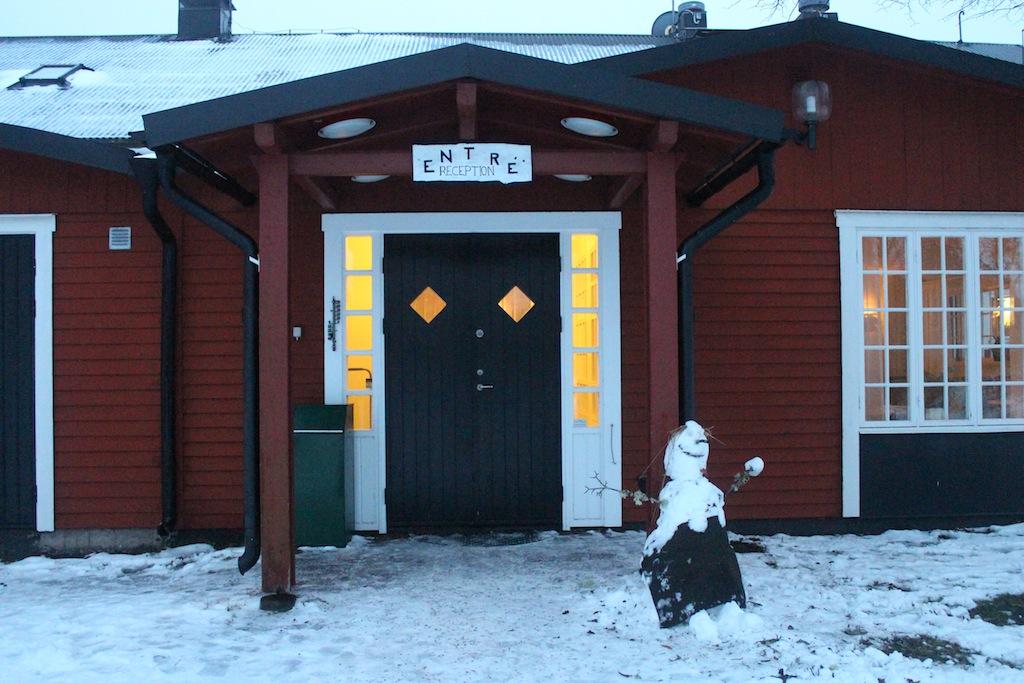A new frontier: The story of a Syrian seeking asylum in Sweden
A snowman stands at the entrance of the hotel where the Swedish Migration Board temporarily accommodates asylum-seekers for free, located two hours north of Stockholm, Sweden.
STOCKHOLM, Sweden — Standing in the snow outside his hotel room, Khassan breathed in the cold Swedish air and tried to calm himself down. He had been Skyping with his family, who are back in Aleppo, where the internet connection is unstable. The call disconnected just as his 5-year-old daughter asked him when he would come home.
Khassan, whose identity is being concealed here for the safety of his family, is one of more than 23,000 people from Syria who have applied for asylum in Sweden since the beginning of 2012.
The nearly three-year conflict in Syria has resulted in the deaths of more than 120,000 people, and 2.3 million people have left the country, mostly to refugee camps in nearby countries. Less than 5 percent of those who escaped Syria have sought asylum outside of the Middle East, but that number is growing since Lebanon and Jordan, overflooded with Syrians, are struggling to handle new arrivals.
Khassan arrived in Sweden in the first week of November 2013. He is part of a growing wave of Syrians who have sought refuge in the Nordic country in the past three months, following the Swedish Migration Board’s Sept. 2 decision to grant all Syrian refugees permanent residence and allow family reunifications. An average of 1,000 Syrians have applied for asylum in Sweden every week since that decision — double the weekly average in the first eight months of 2013.
A native of Aleppo, Khassan, 29, worked as an insurance salesman before the war began. For the first two years of fighting, he and his family insisted on staying home even as their town turned into a battleground. They wanted to believe that the violence and destruction was temporary, that it would all be back to normal soon.
A few months ago, when rockets were fired at their home, nearly killing his wife and newborn baby, and a bomb exploded near his car, Khassan decided they must escape.
“It is war without rules,” he said. “You cannot know when you will die. When you leave home and say to your children 'bye' because you don't know if you see them again. It is horrible.”
The family did not want to go to refugee camps in nearby countries, which they heard were crowded and dangerous, especially during wintertime. Friends recommended Sweden, a country known for its "open arms" refugee policy, but one whose capital is located some 1,800 miles away from Aleppo. Khassan felt that would be his family’s best shot for a peaceful life.
Those seeking shelter in Sweden must apply for asylum from within Sweden.
However, they are not to enter the country on false pretense, like, for example, using a tourist visa. In effect, that leaves human trafficking as the only option for those seeking asylum. Khassan and his family now faced the conundrum that is challenging all Syrians who want to escape to a European Union country.
Determined to reach a safe haven, Khassan got in contact with a smuggler who promised to escort the family from their home in Aleppo across the border into Turkey, and then provide fake European Union passports and a plane ticket to Stockholm. The price: $22,000 per person.
The high cost made it impossible for the entire family to travel, he said. They barely had enough money to pay for one person. So they decided Khassan would go alone. He would then apply for family reunification in Sweden, enabling his wife and children to enter the country in a lawful manner, without needing to pay a smuggler.
In October, Khassan kissed his wife, his daughter and his 4-month-old son goodbye, and snuck out of Syria into Turkey. There, as promised, he was provided with fake documents and a plane ticket.
The expensive trafficking was successful. Immediately upon his arrival in Stockholm, Khassan applied for asylum. Now he is simply waiting as his case is examined. If he is granted refugee status, he will be issued a residence permit and could then apply for family reunification.
“I don't know if my family will manage to stay alive until I get my residence permit,” he said. “Sometimes I feel like maybe I made a wrong choice. If I stayed with them maybe I can protect them.”
I met Khassan in a hotel, located a two-hour ride north of the center of Stockholm. It is one of many temporary accommodations the Swedish Migration Board provides to asylum seekers for free.
The average time for a decision on asylum applications is three months. But the queue is long and constantly growing. Sweden is experiencing the largest wave of asylum seekers it has seen since the Balkan wars of the 1990s, and the majority of those coming in are from Syria.
“We have decided to grant the Syrian refugees permanent residence because that would make it possible for them to bring their relatives to Sweden,” said Anders Danielsson, head of the Swedish Migration Board. “We have to give them some chance in life, and give them a fair chance to integrate into the Swedish society.”
Khassan said he is very thankful for the way Sweden is approaching Syrian asylum seekers, but out of grave concern for his family's safety he has appealed to the Migration Board to expedite his application.
For now, he spends most of his days on the internet, following websites and Facebook contacts for any news coming out of Aleppo, hoping that his family will endure.
“I came here because I love my family. I came here because I want better life for them,” he said. “I can't imagine if something happens to them, what will I do here? If something happens to them I will not forgive myself.”
